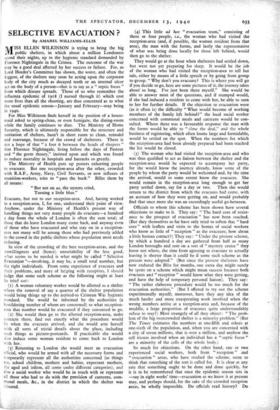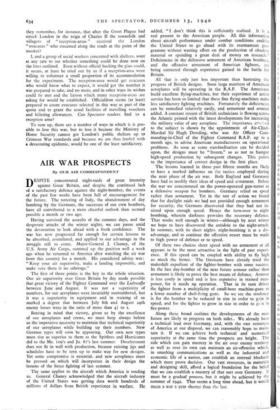SELECTIVE EVACUATION?
By AMABEL WILLIAMS-ELLIS
ISS ELLEN WILKINSON is trying to bring the big LVI public shelters, in which about a million Londoners spend their nights, up to the hygienic standard demanded by Florence Nightingale in the Crimea. The outcome of the war may be a good deal affected by her success or failure. For, as Lord Horder's Committee has shown, the worst, and often the biggest, of the shelters may soon be acting upon the corporate body of the city much as decayed teeth or an internal ulcer act on the body of a person—that is to say as a "septic focus" from which disease spreads. Those of us who remember the influenza epidemic of 1918 (I nursed through it) which cost more lives than all the shooting, are thus concerned as to what the usual epidemic season—January and February—may bring in 1940. spend their nights, up to the hygienic standard demanded by Florence Nightingale in the Crimea. The outcome of the war may be a good deal affected by her success or failure. For, as Lord Horder's Committee has shown, the worst, and often the biggest, of the shelters may soon be acting upon the corporate body of the city much as decayed teeth or an internal ulcer act on the body of a person—that is to say as a "septic focus" from which disease spreads. Those of us who remember the influenza epidemic of 1918 (I nursed through it) which cost more lives than all the shooting, are thus concerned as to what the usual epidemic season—January and February—may bring in 1940.
For Miss Wilkinson finds herself in the position of a house- maid asked to spring-clean, or even fumigate, the dining-room while the family continues to dine. The Ministry of Home Security, which is ultimately responsible for the structure and sanitation of shelters, hasn't in short room to clean, remodel and rearrange, because of the crowd of shelterers. There is not a hope of that "2 foot 6 between the heads of sleepers" that Florence Nightingale, living before the days of Pasteur and "the germ theory," insisted upon and which was found to reduce mortality in hospitals and barracks so greatly.
The Ministry of Health puts up posters exhorting people to evacuate. But one reception-area after the other, crowded with R.A.F., Army, Navy, Civil Servants, or new influxes ot munition-workers, tries to "pass the buck." Billet them by all means: "But not on us, the oysters cried, Turning a little blue."
Evacuate, but not to our reception-area. And, having worked in a reception-area, I, for one, understand their point of view. Anyhow, under the Ministry of Health's present way of handling things not very many people do evacuate—a hundred a day from the whole of London is often the sum total; of those that do leave London many come back, and anyway even of those who have evacuated and who stay, on in a reception- area not many will be among those who had previously added to the crowd in the public shelters whose population most needs reducing.
In view of the crowding of the best reception-areas, and the unwillingness and (hence) unsuitability of the less good, what seems to be needed is what might be called "Selective Evacuation "—involving, it may be, a small total number, but the right individuals. From some experience of evacuees and their problems, and more of helping with reception, I should judge that some such scheme as the following might at least be tried out: • (t) A woman voluntary worker would be allotted to a shelter where the removal of say a quarter of the shelter population would bring things up to the aspired-to Crimean War hygienic standard. She would be informed by the authorities (a bewildering number of whom are concerned) to what reception- area that number would be evacuated if they consented to go.
(2) She would then go to the allotted reception-area, make contacts there, find out exactly what the procedure would be when the evacuees arrived, and she would arm 'herself with all sorts of trivial details about the place, including such things as picture-postcards. If .practicable she would also induce some woman resident to come back to London with her.
(3) Returning to London she would meet an evacuation official, who would be armed with all the necessary forms and temporarily represent all the authorities concerned (as things are, school children, mothers and babies, expectant mothers, the aged and infirm, all come under different categories), and also a social worker who would be in touch with or represent all those who had to do with the provision of canteens, com- munal meals, &c., in the district in which the shelter was situated. (4) This little ad hoc "evacuation team," consisting of three or four people, i.e., the woman who had visited the reception-area (and, if possible, the woman resident from that area), the man with the forms, and lastly the representative of what was being done locally for those left behind, would then go to the shelter.
They would go at the hour when shelterers had settled down, but were not yet preparing for sleep. It would be the job of the woman who had visited the reception-area to tell her tale, either by means of a little speech or by going from group to group. "Why don't you evacuate? This is where you will go if you decide to go, here are some pictures of it, the journey takes abouf so long. I've just been there myself." She would be able to answer most of the questions, and if stumped would, if she had induced a resident to come with her, be able to turn to her for further details. If the objection to evacuation were (as it often is) the difficulty "What would become of working members of the family left behind?" the local social worker concerned with communal meals and canteens would be con- sulted. Where there was a favourable response the man with the forms would be able to "close the deal," and the whole business of registering, which often looms large and formidable, would he settled on the spot. When the numbers for which the reception-area had been already prepared had been reached the list would be closed.
(5) The woman who had visited the reception-area and who was thus qualified to act as liaison between the shelter and the reception-area would be expected to accompany her party, for she would know the journey already, know some of the people by whom the party would be welcomed and, by the time she arrived, would to some extent know the evacuees. She would remain in the reception-area long enough to get her party settled down, say for a day or two. Then she would return to the district from which the evacuees had come, with an account of how they were getting on, and would probably find that once more she was an exceedingly useful go-between.
Officials to whom this scheme has been shown have several objections to make to it. They say: "The hard core of resist- ance to the prospect of evacuation" has now been reached. (But they themselves so far have only tried to soften that "hard core" with leaflets and visits to the homes of social workers who know as little of " reception " as the evacuees; how about a little human contact?) They say: "Under the present scheme, by which a hundred a day are gathered from half as many London boroughs and sent on a sort of "mystery cruise" they know not where, the time from agreeing to evacuate to actually leaving is shorter than it could be if some such scheme as the present were adopted." (But since the present shelterers have now endured the Blitz for months, one extra day might surely be spent on a scheme which might mean success because both evacuees and " reception " would know what they were getting, and have the help of temporary personal liaison). They say: "The rather elaborate procedure would be too much for the evacuation authorities." (But I offered to try out the scheme experimentally myself; moreover, have they any idea of the much harder and more exasperating work involved when the wrong numbers arrive at a reception-area and, because of the muddle, a large proportion of evacuees quite understandably refuse to stay?) Most strangely of all they object: "The prob- lem Of the big overcrowded shelter is a minority problem." (But The Times estimates the numbers at one-fifth and others at one-sixth Of the population, and, when you are concerned with a city of seven millions, that is over a million, and anyhow the cell tissues involved when an individual has a "septic focus" are a minority of the cells of the whole body.) So much for objections. On the other hand, one or two experienced social workers, both from " reception " and " evacuation " areas, who have studied the scheme, seem to think that something of the sort is called for. It is clear at any rate that something ought to be done and done quickly, for it is to be remembered that once the epidemic season sets in —say in eight weeks' time—evacuation as we know it at present may, and perhaps should, for the sake of the crowded reception areas, be wholly impossible. Do officials read history? Do they remember, for instance, that after the Great Plague had struck London in the reign of Charles II the townsfolk and villagers of " reception-areas " received the London " evacuees " who streamed along the roads at the point of the musket?
I, and a group of social workers concerned with shelters, want at any rate to see whether something could be done now on the lines outlined. Even without official backing the plan could, it seems, at least be tried out by us if a reception-area were willing to volunteer a small proportion of its accommodation for the experiment. The reception-area would get evacuees who would know what to expect, it would get the number it was prepared to take, and no more, and in other ways its wishes could be met and the liaison which many reception-areas are asking for would be established. Officialdom seems (at least) prepared to count evacuees selected in this way as part of the quota and to grant the usual facilities of travelling vouchers and billeting allowances. Can Spectator readers find us a reception area?
To sum up, there are a number of ways in which it is pos- sible to lose this war, but to lose it because the Ministry of Home Security cannot get London's public shelters up to Crimean War standards and because we are thus landed with a devastating epidemic, would be one of the least satisfactory.











































 Previous page
Previous page